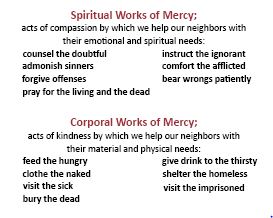
There are two main things that our Holy Father wishes for us to be thinking about during this special year:
• God is merciful and the Church is there with all the sacraments to offer us that mercy.
• We need to share that mercy with those we come in contact with everyday.
Mercy is therefore, something which we receive, but it is also something which we must share with others.
Pope Francis has described his entire papacy so far as a “Kairos” of Mercy, meaning that it (his papacy) is a privileged moment in God’s plan of salvation. When announcing the Extraordinary Year of Mercy he said, “I am convinced that the whole Church — which has much need to receive mercy, because we are sinners — will find in this jubilee the joy to rediscover and render fruitful the mercy of God, with which we are all called to give consolation to every man and woman of our time.”
In a letter which he addressed to Archbishop Rino Fisichella, President of the Pontifical Council for the Promotion of the New Evangelization, the Holy Father communicated his desire that this Jubilee be for all believers “a true moment of encounter with the mercy of God…that the faith of every believer may be strengthened and thus testimony to it (Mercy) be ever more effective.”
Therefore, in order to fully participate and receive all the “benefits” during this Year of Mercy, it is necessary to have a plan.

The Jubilee Year of Mercy must not, first of all, be looked upon as just one more devotion in the Church. It must be recognized rather, as the gift that it is, made available by the Church to all believers.
In order to fully benefit during this Year of Mercy, we need to commit to opening ourselves up to receiving the graces of mercy that are offered. Graces which will relieve us of the heavy burden caused by our sins. This can be done by following these two very easy steps:
• Obtain the plenary indulgences made available through a pilgrimage to the “Holy Doors”.
• Practice the Corporal and Spiritual Works of Mercy throughout the year.
First of all, to obtain the plenary indulgence. Pope Francis continues in his letter to Archbishop Fisichella:
“To experience and obtain the Indulgence, the faithful are called to make a brief pilgrimage to the Holy Door, open in every Cathedral or in the churches designated by the Diocesan Bishop, …as a sign of the deep desire for true conversion… It is important that this moment be linked, first and foremost, to the Sacrament of Reconciliation and to the celebration of the Holy Eucharist with a reflection on mercy. It will be necessary to accompany these celebrations with the profession of faith and with prayer for me and for the intentions that I bear in my heart for the good of the Church and of the entire world.”
Once we have taken this first and most important step of gaining the plenary indulgence, our hearts will be more disposed and we will be ready to move on to the second step; putting into practice the Works of Mercy all throughout the Jubilee Year.
It would be a good idea at this time to re-visit the pages of our Catechism, recommitting once again to memory these Spiritual and Corporal Works of Mercy:
So it is, in this great Year of Mercy, that by taking the first step—recognizing that we need conversion and the Sacrament of Reconciliation—we are able, in turn, to bring mercy to our brothers and sisters around us. Come Holy Spirit and renew the face of the earth! (Ps 104:30) v